
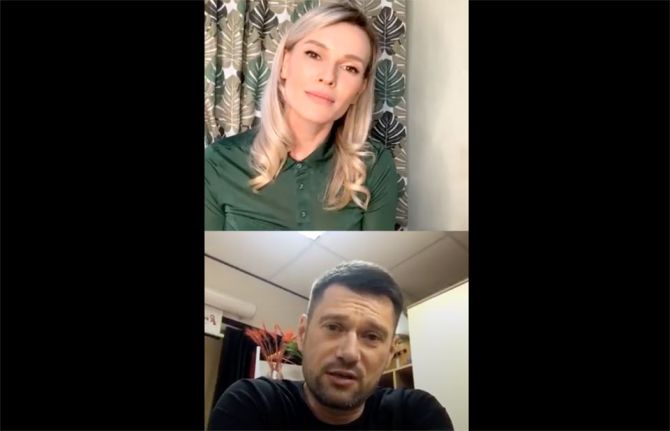
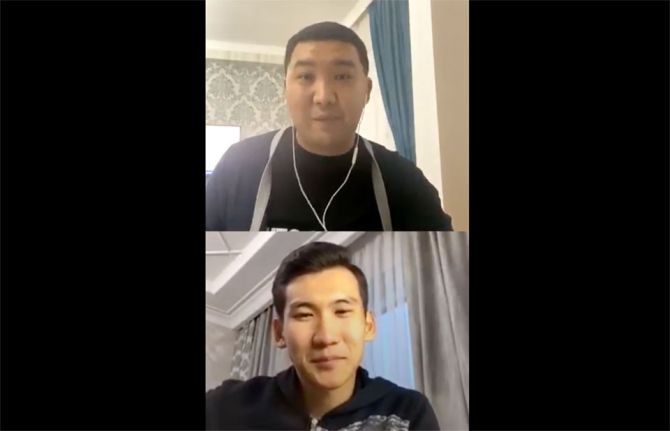
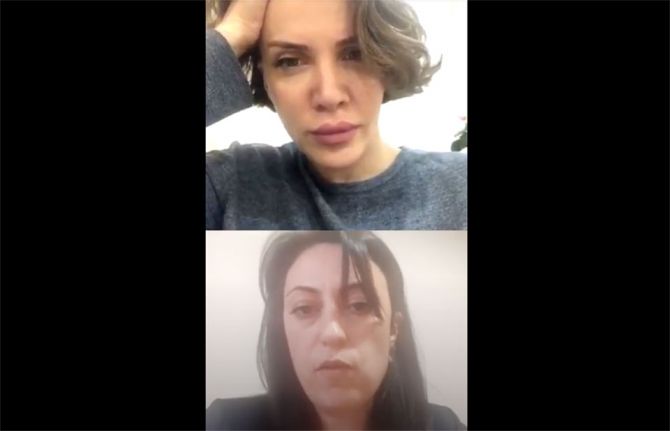
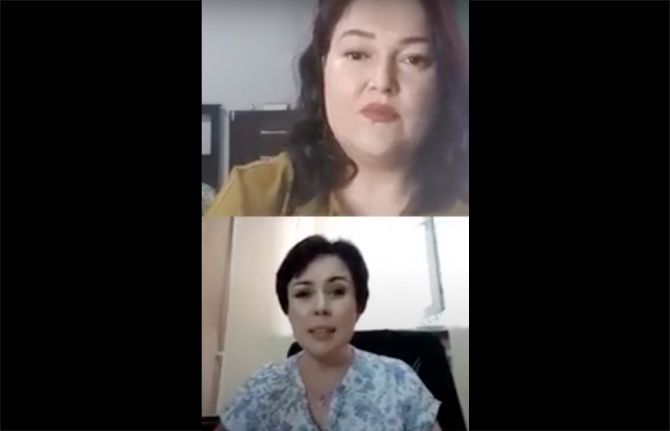
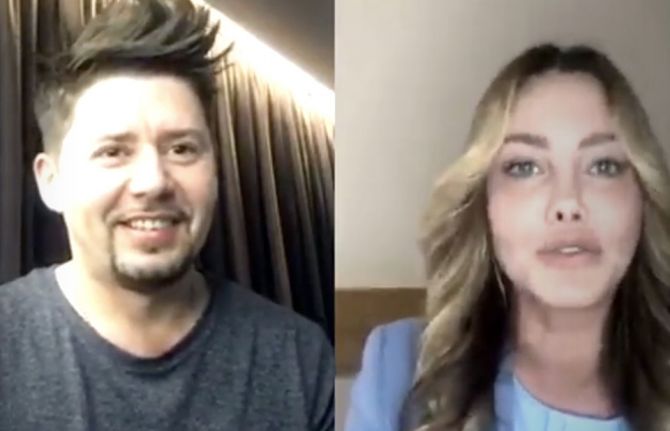
Feature Story
#TogetherWeWin: inspiring examples of solidarity during the COVID-19 outbreak in eastern Europe and central Asia
28 July 2020
28 July 2020 28 July 2020Inspiring stories of solidarity during the COVID-19 outbreak in eastern Europe and central Asia have been shared by community leaders, businesspeople, celebrities and others. Under the umbrella of #TogetherWeWin, a series of Instagram and Facebook Live talks have shown how people are supporting each other in this difficult time.
“The COVID-19 pandemic has become not only a challenge to health care and economies, it has also become a test for social solidarity. We have seen some amazing examples of solidarity and unity in supporting people who are left behind,” said Alexander Goliusov, Director, a.i., of the UNAIDS Regional Support Team for Eastern Europe and Central Asia.
Arusik Mkrtchyan, from Armenia, a long-time friend of UNAIDS, spoke with Narine Manukyan, chair of the AI MAYER (Armenian Mother) charity, which helped more than 300 families who lost their livelihoods during the lockdown with food and medicine. “I have always believed that charity should support people in a sustainable and long-term way, create opportunities for people to solve their problems by themselves. But in this situation, families with children with disabilities whose parents lost their jobs faced the problem of not having food to eat,” said Ms Manukyan. Ms Mkrtchyan also spoke with Hamlet Khnkoyan, who started the Let’s Help Families in Need movement, which initially helped several families in his neighbourhood with food supplies but snowballed into supporting more than 600 families.
Olya Tira, the UNAIDS Goodwill Ambassador for the Republic of Moldova, spoke with the blogger Lilu Ogovan, a founder of Together for You, Anna Racu, and Ruslan Poverga, from the Positive Initiative.
Ms Racu spoke about Together for You, which supported medical personnel by providing personal protective equipment and disinfectant, as well as purchasing other medical equipment. Aid was initially provided to ambulance stations, but, over time, hospitals that were looking after patients with COVID-19 were also helped. Mr Poverga said that the Positive Initiative, together with partners, delivered antiretroviral therapy to more than 850 people living with HIV, including 65 Moldovans who were trapped abroad during the lockdown. “The crisis forces people to be creative. People stopped thinking in terms of “possible” and “impossible”, we just know that it is necessary to do this and that’s it, and the question is only how exactly we will achieve what we want. And I am very glad that, thanks to our partners as well, we have succeeded,” Mr Poverga said.
In Belarus, there was a live broadcast by Yuri Tkachuk, a singer, television presenter and member of the country’s UNAIDS Red Ribbon Team. UNAIDS Goodwill Ambassador Svetlana Borovskaya, along with television journalist and producer Irina Rombalskaya, as well as representatives of the People Plus community organization, Tatyana Zhuravskaya and Anatoly Leshenok, and Julia Stoke from the Positive Movement, discussed the theory of small actions.
“I believe in this theory. Even when it looks like you do not have a lot of time and financial resources, you can still help substantially. For myself, I chose the path of one good deed a day,” said Ms Rombalskaya, who is buying food and medicine for older people during the lockdown. Ms Zhuravskaya and Mr Leshenok organized the delivery of antiretroviral therapy and helped Belarusians who were outside the country when the border was closed to obtain antiretroviral therapy.
In Kazakhstan, a Facebook Live stream was hosted by Adele Smith, a television presenter and head of the Charity Warehouse project. She talked to Aruzhan Sain, the Commissioner for Children’s Rights in Kazakhstan and founder of the Volunteer Charity Foundation, which helped children with serious illnesses during the COVID-19 outbreak when, due to the closure of the border, there was a significant shortage of medicines and medical supplies. Volunteers found and purchased medical equipment and medicines and delivered them to children’s hospitals, with the foundation later expanding its work to other medical institutions.
Konstantin Avershin, a businessman and leader of the I’m Alma-Ata movement in Kazakhstan, initiated the Who If Not Me challenge, aimed at helping people in need. Assistance was provided in various areas, from the supply of personal protective equipment to doctors to legal support for victims of domestic violence. The challenge brought together 14 cities in Kazakhstan, many volunteer networks operating in the country and the government.
Elena Bilokon, the founder of the Community of Women Living with HIV in Kazakhstan, also joined the broadcast and spoke about her story of supporting people from key populations and about living with HIV in a crisis.
Erkin Ryskulbekov, a UNAIDS Goodwill Ambassador for Kyrgyzstan and television presenter, invited a human rights activist, Gulgaaki Mamasalieva, and Kyrgyzstan’s triathlon champion, Aivaz Omorkanov, to his Instagram Live feed.
Ms Mamasalieva shared her experience in creating an online forum that brings together most of the country’s volunteer organizations and makes it possible to make a direct request for assistance and receive an immediate response. The forum is based on the Telegram platform and facilitates volunteers communicating with each other during an emergency. “We have 10 years of experience in civil monitoring. We know all the standards and requirements for providing such assistance, including how these processes should be organized during emergencies,” said Ms Mamasalieva.
Mr Omorkanov spoke about how he managed to complete his triathlon training programme while staying at home under lockdown as well as starting an online fundraising initiative, inviting world sports starts to join him and raise funds to provide personal protective equipment for doctors at the infectious diseases hospital. In total, US$ 6500 was raised. “My message was that we can help our country even while staying at home,” said Mr Omorkanov. In addition to raising funds, the action had another goal—to encourage people to do sports and maintain a healthy lifestyle, even while under lockdown.
Mr Ryskulbekov ended the discussion by saying, “When I do charity work and help people, I understand that although my actions are needed by others, I’m actually the one who needs it the most; it’s me who becomes happier by doing good things.”



